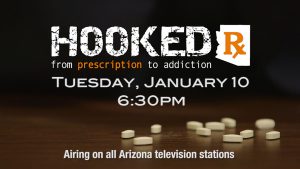- Slug: BC-CNS-Opioids Take Action,530
- 360 video here
- EDS: PLEASE RUN THE HOOKED PROMO PHOTO (below) OR THIS BOX WITH THIS STORY IF YOU PLAN TO PUBLISH PRIOR TO JAN. 10: Watch “Hooked Rx: From Prescription to Addiction,” a 30-minute commercial-free investigative report airing at 6:30 p.m. on Jan. 10 on 30 broadcast TV stations in Phoenix, Tucson and Yuma and 97 of the state’s radio stations. For the full report, go to hookedrx.com.
Cronkite News
PHOENIX – The key to stopping opioid addiction is recognizing the potential abuse before it takes hold. But, there are treatment programs for any stage of addiction.
Here are resources to identify abuse and seek assistance:
Warning Signs
Debbie Moak, director of the Arizona Governor’s Office of Youth, Faith and Family, told Cronkite News in October that “parents are in the No. 1 position to influence whether their sons and daughters will use drugs or not use drugs.” Unexplained changes in the behavior could point to adolescent substance abuse, according to the National Institute on Drug Abuse. Adolescents who “act withdrawn, frequently tired or depressed, or hostile” could be developing a problem. According to NIDA, behavior to be mindful of includes:
● A change in peer group
● Carelessness with grooming
● Decline in academic performance
● Missing classes or skipping school
● Loss of interest in favorite activities
● Trouble in school or with the law
● Changes in eating or sleeping habits
● Deteriorating relationships with family members and friends.
NIDA recommends that parents seek help from professionals if their child is abusing drugs. The first step could be taking your child to the doctor for screening – for drugs or other health conditions. The agency also suggests contacting addiction specialists such as the American Society of Addiction Medicine or the American Academy of Child & Adolescent Psychiatry, each of which has a physician search feature on its website.
Finding Help
The Governor’s Office of Youth, Faith and Family has several programs, including the Angel Initiative, which allows drug users “to walk into a police precinct, turn in their drugs and request treatment without fear of prosecution,” according to the state’s website.
The agency also provides a roadmap for finding treatment plans and centers. The website will walk you through the questions to ask when searching for treatment options, such as whether a program accepts insurance, whether the patient is motivated for treatment and what types of treatment programs are utilized.
Researchers at Arizona State University’s Center for Applied Behavioral Health Policy have developed a guide for finding medication-assisted treatment in Arizona. The guide lists physicians and providers – and their contact information – throughout the state.
The Substance Abuse and Mental Health Services Administration provides a wealth of information on how to spot drug abuse, how to approach a patient and where to find help.
● A guide for what teachers need to know and look for if they suspect a student might be abusing prescription medication.
● A guide for patients and family members on spotting and preventing overdoses.
● A Opioid Overdose Prevention Toolkit for community members.
● Information on medication-assisted treatment programs that combine behavior therapy with medications such as buprenorphine.
● It also includes links to news stories, such as How to Stage an Intervention.
